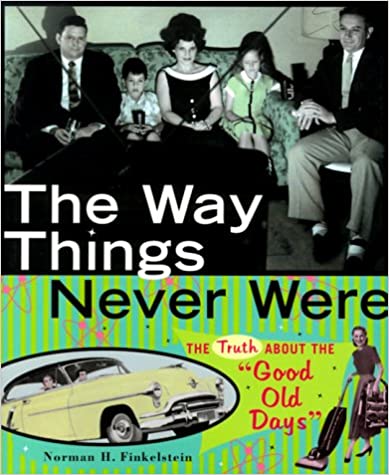In 1999, the book The Way Things Never Were: The Truth About the “Good Old Days” by Norman Finkelstein was published. I have a copy. My family grew weary of me referring to it in every conversation twenty years ago, so there it sits on the shelf.
It is less than 100 pages, with plenty of pictures, so no one has the excuse that it is too long and complicated to read.
Chapter titles are:
“People Were Healthier”
“Pass the Pot Roast Please”
“Home, Sweet Home”
“We Never Locked Our Doors”
“See the USA in Your Chevrolet”
“We Respected Our Elders”
“Golden Childhood”
In reality, in the “Good Old Days,” people died younger, ate unhealthy food, breathed less clean air, and needed to lock doors. Travel was difficult, we did not respect authority like we might imagine, and we lived childhoods viewed through the lens of nostalgic television programs.
Shifting the concept over to publishing, it has never been so good for so many writers as it is right now. For Pete’s sake, you can write on a laptop computer that checks your spelling and grammar and can have a book for sale in a month!
So I offer The Way Things Never Were in Publishing: Gone are the “Good Old Days” by Dan Balow
Annotated table of contents:
The author never had to market their book – Never, ever the case. Maybe they didn’t have social media, but the author was and always will be the #1 marketing element for any book.
Writing was better – Yes, if you consider the presence of more literary and artistic types of writing. But from an overall communication standpoint, there is far more attention to the reader today than in the past.
Publishers stuck with authors longer – Writing is a failure-based business, like hitting a baseball where you are considered great if you succeed 30-40% of the time. It always will be. With few exceptions, it’s always been a transitory industry. “Who’s up next?”
Authors made more money – Overall, income from publishing has always been concentrated to the few. It’s always the same, with a small number of authors making the lion’s share of the money and a few more making a decent amount. But the substantial majority have always needed to keep their day job or have an alternate source of income to continue writing.
Authors lived glamorous lives – Yes, for the few at top, just like today. But with this status, came the never-ending pressure to “do it again,” which is the flip side of success.
Publishers cared more – Publishing is far more author-friendly now than it used to be many years ago when powerful gatekeepers treated authors somewhat badly because there were no alternatives.
Authors could write whatever they wanted – Traditional publishers always look for certain types of books. Authors who wish to participate in the traditional world need to have some level of understanding what publishers and agents want. It’s always been this way.
There was more substantive writing – Some of the greatest thoughts ever have been written in books and so have some of the worst ideas ever pondered. Weak theology was prevalent 100 years ago, as it is today. There is no end to great insight and less-than-helpful ideas.
Authors were a respected group of artists – Maybe; but like today, respect didn’t make them immune from being criticized by reviewers. Mass reviewing from Amazon pales in the comparison to three or four respected book reviewers panning a book, which is promptly pulled from store shelves, killing sales overnight.
There is no such thing as the good old days.
Have a nice week!



 How to Make Me Stop Reading
How to Make Me Stop Reading
We once had a muscle car,
ice-green Camaro, 69,
which made us the shining stars
when dragging Main, oh, it was fine!
True, the steering was ‘bit vague,
and suspension put our butts to sleep;
quick-dropping fuel gauge was a plague,
but it was sure a car to keep
until we met its fresher sibling,
born and bred in 2010,
and the bells of truth did thus ring
that living in ‘remember when’
does convey a sense of style,
but staying there is not worthwhile.
We do tend to imagine we have it tougher than the back ten. Insightful article. Thank you.
Yes, knowing a bit of history, I am always baffled by talk of the good old days!